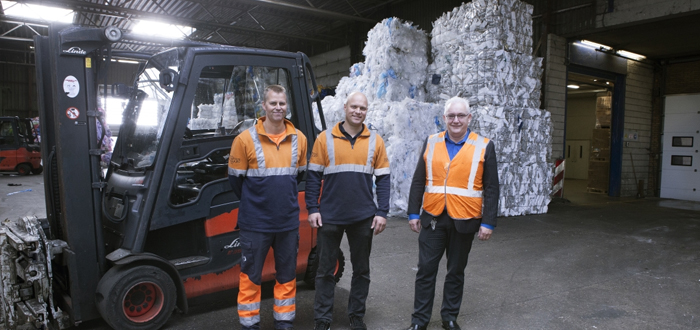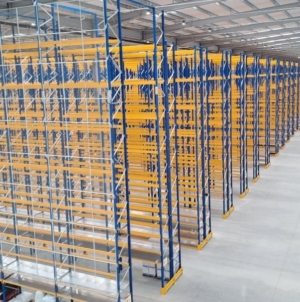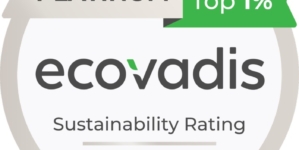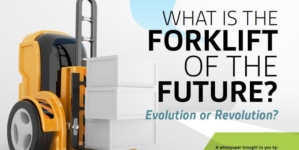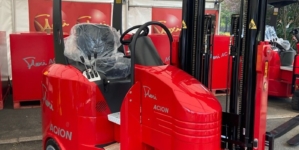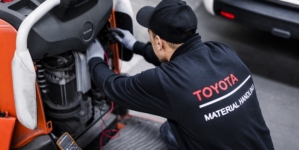-
Nutrivend selects Forterro’s Orderwise to support online expansion and streamline operations - April 11, 2025
-
ARROWXL LAUNCHES AMBITIOUS ZERO WASTE ROADMAP - April 8, 2025
-
THE BCMPA’S NEW CAMPAIGN DRIVES OUTSOURCING SUCCESS IN Q1 - April 7, 2025
-
BLACKOUT TECHNOLOGIES TARGETS TELEMATICS-INTEGRATED MOBILE DEVICE BLOCKING TO COMBAT SMARTPHONE DISTRACTION - April 1, 2025
-
Sparck Technologies awarded Royal designation - March 27, 2025
-
OpenADR Alliance announces first OpenADR 3.0 certified products with EVoke Systems, E.ON Energy and Universal Devices - March 25, 2025
-
Growing fulfilment and contract packer appoints new Managing Director - March 25, 2025
-
When is it time to invest in a WMS? Understanding the key trigger points - March 25, 2025
-
eCapital helps Vantage Recruitment on its journey to financial success - March 24, 2025
-
Hugo Beck Celebrates 70 Years of Packaging Innovation with Open House Events - March 20, 2025
Kras Recycling Places Its Trust In Fronius Technology For Charging Its Fleet Of Electric Forklift Trucks.
The Dutch family-owned enterprise Kras Recycling is a specialist in sorting and reprocessing paper, foils and plastics. For transport within the plant, Kras Recycling relies on electrically-powered forklift trucks – and on the energy-efficient charging technology from the Austrian expert Fronius. The Selectiva devices with the innovative Ri charging process significantly reduce both energy consumption and CO2 emissions, while simultaneously extending the service life of the batteries. Thanks to their compact dimensions, the company has been able to accommodate the chargers easily, despite limited space – and has done so in an extremely creative way.
Whether in the supermarket or when purchasing a new television, no matter whether at home or in the office – we constantly leave behind packaging, everywhere we go. A large part of it consists of paper and plastics. The latter are particularly harmful for the environment, as plastic only decays slowly – it can take more than 400 years until full decomposition. Approximately 35 percent of worldwide plastic consumption is due solely to packaging. And only around ten percent of the total plastic waste on the earth has been reprocessed to date – the majority of it is found in the environment or on landfill sites. Yet the remains are a valuable raw material from which many new products can be manufactured following the correct treatment. Kras Recycling, which is now run by the third generation of the same family, has its headquarters in Volendam, just over 20 kilometres from Amsterdam. The company has dedicated itself to the recovery and reprocessing of various waste materials. Having started life in 1951 as a small firm, Kras Recycling is now a corporate group that is active throughout the world, with branches in the Netherlands, Belgium and Hong Kong, and an annual turnover of around 70 million euros.
Efficient Material Transport With Fleet Of Electric Forklift Trucks
Every day, multiple tonnes of waste are delivered to Kras Recycling. This waste ranges from household packaging such as bags, air cushions or cardboard boxes, through to pipelines that are several metres long, plastic barrels or production and storage remnants from industry. “We obtain our material primarily from large companies,” explains Marco Kras, operational manager at Kras Recycling. “At our sites in the Netherlands and Belgium, we have a storage and production area of almost 50,000 square metres.” The company employs more than 100 staff. In the first stage of the process, they sort out the material. Next, it is shredded in special machines to create granules of different sizes, and packed into bags for transport. “Yet we do not only produce recycled raw material. We are also responsible for manufacturing new products for some of our customers,” explains Kras. “However, we cannot manage this at our sites, and instead commission other companies to carry out the work. The customer delivers their waste to us and receives a product in mint condition from us. In this way we create a cycle that conserves resources and protects the environment.”
In order to presort and move the items in a quick and energy-efficient manner in the yard and the halls, Kras Recycling makes use of a fleet of forklift trucks from the manufacturer Linde. Twenty-five of the 32 forklift trucks are powered by electricity. When it comes to charging, the company places its trust in the technology from the Austrian specialist Fronius. “In the past, we have tried many things with the forklift trucks and the charging technology,” says Kras. “Previously, prior to the energy efficiency regulations, we had mainly diesel-powered forklift trucks in the plant. However, these were loud and not exactly environmentally-friendly, due to their exhaust emissions. It was well over ten years ago now that we first tried out electric forklift trucks, and we purchased a few of these vehicles at that time.” However, the charging technology gave rise to recurring problems, with the water consumption in particular being huge and resulting in high costs. This is because a water-acid mixture is required for the chemical reaction that is used to charge the battery. When charging the battery, the water evaporates and must therefore be topped up at regular intervals. Then Kras discovered the battery charging technology from Fronius. “The devices operate flawlessly and reduce the water consumption. We were impressed from the very beginning,” states Kras.
Fitted To Save Space
In 2014, Marco Kras transitioned the majority of his company to electric forklift trucks at his Dutch sites in Volendam, Amsterdam and Almere. “Because of our experiences with their products, the charging technology from Fronius was our first choice,” Kras says. Since then, Selectiva chargers have been in use at Kras Recycling. These were supplied and installed by the Dutch sales partner of Fronius, R & W Batterijen. When it came to installing the charging station, the limited space that was available presented a major challenge. “Our warehouse capacities are pretty much fully exploited,” explains Kees Tol, maintenance and supply officer at Kras Recycling. In Volendam, Marco Kras therefore decided to install the chargers in one of his halls at a height of over two metres. A steel structure directly below makes it possible to store the batteries on two levels, one above the other, during charging. “This means that we save some space,” stresses Tol. The charging station is equipped with sliding doors and can be closed off. “If an employee needs to change a battery, they can simply open the door. The rest of the time, the expensive batteries and the chargers are effectively protected from dust and dirt,” he explains. The heavy batteries are lifted with the aid of forklift trucks and positioned in the fixture.
The construction of a charging station like this was only made possible by the Selectiva chargers from Fronius. They are not only particularly small and compact, but are also equipped with an external start-stop mechanism. “Our employees can simply plug in the batteries and unplug them again, without having to configure any settings on the device. Thanks to the automated start-stop system, everything else happens automatically,” says Tol, emphasising the user-friendliness of the devices. Moreover, an optional feature uses a pilot contact in the charging plug to prevent sparking if an employee interrupts a charging process by pulling out the plug prematurely. “This practically rules out any danger of an explosion caused by oxyhydrogen generated during charging,” explains Marc De Cloedt, account manager at R & W Batterijen.
Ri Charging Process Minimises Overcharging
What is more, the Selectiva chargers from Fronius make use of the Ri charging process. “This is the most advanced process currently available on the market,” states Marc De Cloedt. Conventional charging processes follow a fixed characteristic, meaning that a significant part of the energy used is converted into heat without beneficial effect. Hydrogen also often forms here, which then escapes from the battery and combines with the oxygen in the ambient air to create oxyhydrogen. This gas formation presents an explosion risk and results in increased water consumption. Things are different with the Selectiva devices. “The Ri charging process is dependent on the age, temperature and condition of the battery,” says Marc De Cloedt, explaining the special feature of the devices. “This technology minimises harmful overcharging, and thereby also water consumption and energy loss.” Yet that is not all: the Ri process also has a positive effect on the service life of the batteries. The battery heats up less during charging, meaning that its capacity is preserved for a longer period of time, and that the charging process is gentler. The lower electricity consumption not only reduces the operating costs of the forklift truck fleet, but also the CO2 emissions.
The limited available space also constituted a considerable challenge at the site in Almere, just over 50 kilometres away. “This is where we store and process hard plastic that is rigid and bulky by design, and cannot be compressed for storage,” explains Kras. Ultimately, the operational manager developed his own efficient solution to this problem: “We simply ordered a large shipping container, had the lower section of one end cut out and installed the container in the yard, directly opposite the halls.” Five Selectiva chargers are housed in the container. The opening is covered with transparent slatted curtains made from plastic strips, which provide optimum protection, yet simultaneously enable easy access. The slats do not extend all the way to the ground, meaning that adequate ventilation is also guaranteed at all times. “Our employees can adjust the batteries from outside. In addition, it is possible to access the container through a door on the side. This makes it easy to connect the batteries to the battery charging system.” Another advantage: if necessary, it is a quick and easy task to move the container or to extend it with another. This gives a great deal of flexibility.
Continuing To Rely On Fronius
Marco Kras is completely satisfied with the charging technology from Fronius: “With these devices, we have been able to obtain considerable savings in terms of electricity consumption and to improve our carbon footprint – an important step for the continued optimisation of our energy efficiency. What is more, the Fronius charging technology functions flawlessly. There have been no problems or defects so far, and we can rely on the high availability of our forklift truck fleet at all times,” he stresses. “Due to a large fire at our Amsterdam site we are having to build up everything again from scratch there – including the charging station. Our experie



























